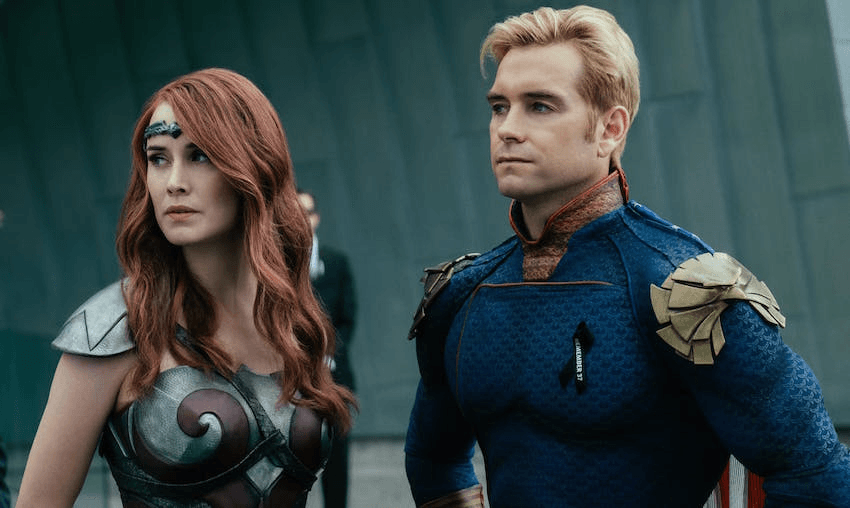Sam Brooks reviews The Boys, dropping today on Amazon Prime, and finds it far from the critique of superhero fantasies he was promised.
In the third episode of Amazon Prime’s new superhero series The Boys, newly-official superhero Starlight (Erin Moriarty) has a meeting with corporate to discuss her new outfit, which is decidedly skimpier than her current one. She’s very recently become a member of The Seven, the most famous superhero team in America, complete with its own merchandise. The team is run by decidedly shady corporate executive Madelyn (the always welcome Elisabeth Shue), who is using them for her own nefarious purposes while they maintain an image of being the nation’s best and brightest.
In this meeting, two ‘writers’ give her a rundown of her superhero narrative. She’s moved from a small town to the Big Apple, full of “rapists, muggers, thieves” and learned to “embrace her feminine strength”. They ensure her that this skimpier outfit is “bold, brave and feminist”.
The scene is a perfect example of what The Boys spends its entire running time doing, especially with the Starlight character. In this scene, we’re meant to laugh at the things these writers are saying; they’re obviously meant to be a parody of a nerd who thinks Buffy is the height of feminist representation. To them, because a woman is knocking monsters and things down, it’s a feminist piece of work.
This could work if The Boys hadn’t just spent two episodes defining Starlight solely as ‘the chick’. In the first episode, she is sexually assaulted upon her entry into The Seven, and in the second she prevents the sexual assault of a woman, and is reprimanded by her corporate overlords for being caught on video doing it. It’s one thing to use a character as a way to address gender, especially in a genre that still doesn’t treat women well; it’s another thing entirely when that character’s plotline entirely revolves around her gender.
The Boys is fraught with this kind of thing. On its desaturated surface, it appears to be a critique of the power fantasy inherent in most of the genre: that if you’ve got superhero powers you have the right to use them as you see fit, everybody else be damned. But the show’s creators, Garth Ennis and Darick Robertson, can’t help but base the show’s most visually exciting and compelling moments on that very same power fantasy.
The central conflict revolves around The Seven – led by a Superman/Captain America expy with the unsubtle name Homelander (played by New Zealand’s own Antony Starr) – and their constant, obvious abuses of their powers. Ranged against them are The Boys – led by the similarly unsubtly-named Billy Butcher (Karl Urban, another Kiwi!) – a vigilante group that recruits Hughie (Jack Quaid) after his girlfriend is unceremoniously turned into pink mist by Seven member A-Train (Jessie Usher). Butcher has a vendetta against superheroes, for reasons that slowly become blandly clear. He’s a male character with anger issues in a gritty superhero show. You know why he has a vendetta.
The whole endeavour is exhausting. It’s totally fine to have flawed characters with murky motivations and contradictions – that’s what all of humanity is at the end of the day. What’s less fine, and less interesting, is when everybody on a show is an unlikeable, violent monster who engages in the very same abuses of power as the people they’re supposedly against. It’s even more exhausting when you consider that The Boys wrings out every minute of its hourlong runtime; episodes feel bloated, full of overlong scenes where characters mope at each other.
The show also has an eye-rolling approach to sex and violence. The opening scene, in which Hughie’s fiance is accidentally killed by the superfast A-Speed when he rushes through her on the way to a crime, takes pains to show us just how much her body is disintegrated into pink mist. Likewise, a scene in the third episode where a woman crushes a man’s head between her legs during sex is treated like a punchline. The showrunners clearly don’t know how to handle either topic with maturity or complexity, so opt to show off special effects and slow-motion instead.
Which is a shame, because The Boys has assembled a formidable cast. Antony Starr is a brilliant choice for a Captain America type – he has a wholesome, handsome look but there is a coldness in his charisma that can be unnerving. Elisabeth Shue somehow manages to make the line “It’s almost as if the holes came from two small high intensity beams, roughly the width of human eyes” feel like it came from a human’s mouth and not a writer’s fingertips. Karl Urban does his usual haunted thing well, even when saddled with a British accent on the wrong side of Liverpudlian.
When some of our most profitable content revolves around superheroes, there’s room for reassessment of the genre’s tropes – especially when even the most uplifting and light of the Marvel movies include enough blatant militarism to give a viewer pause, to say nothing of the darker DC Universe. Unfortunately, The Boys isn’t the critique we were waiting for.
In fact, it’s worse than no critique at all. It gives the illusion of critical commentary without actually attacking or addressing any of the building blocks that have made this genre such a titan. After all, why would you take the power out of the power fantasy when the status quo is so much fun?
